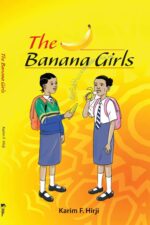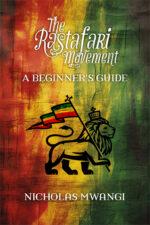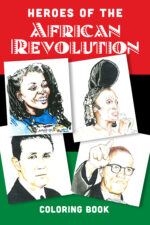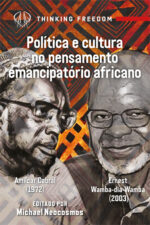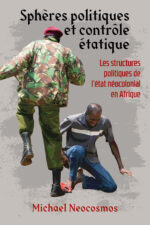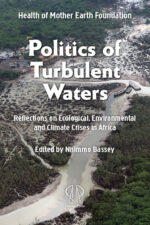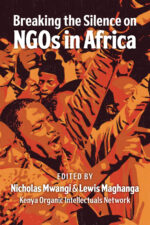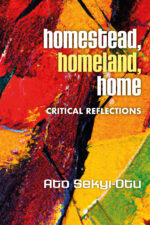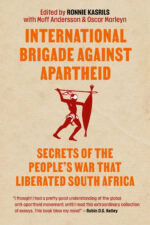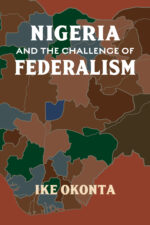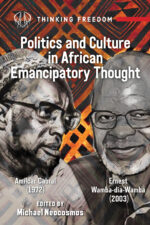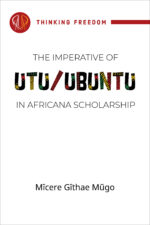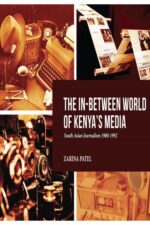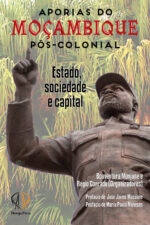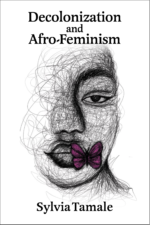-
I see the invisible
Author’s Note
Truth be told, I never thought I would write another volume of poetry after the last, I will not Dance to Your Beat (2011). The reason was that my previous volumes were reactive to the circumstances of the times. Patriots and Cockroaches (1992) was a reaction to the socio-political corruption that had engulfed Africa and dimmed the enthusiasm that had been built by the years of struggle for independence. Whereas we thought we were stepping into a post-colonial era, what we stepped into was a vicious neo-colonial times. The next collection, Poems on the Run (1995) was a reaction to military autocracy and the repression that followed. The volume was literally written underground. This was followed by Intercepted (1998) all written while detained at Kalakuta Republic of Alagbon Close. We Thought it was Oil But it was Blood (2002) responded to two things primarily – extractivism and the accompanying human and environmental rights abuses in the Niger Delta and elsewhere. The massive erosion of biodiversity and attacks on food sovereignty through the introduction of genetically modified organisms (GMOs) into our agricultural system inspired I Will not Dance to your Beat.
What you have in your hands, or on your screens, is a compilation that is largely more meditative than the previous collections. There are moments of reflection on the colonial and neoliberal foundations that permit a willful disconnection from nature and the resultant destructive extractivism.
Some of the poems came through conversations and poetry writing sessions with Peter Molnar, Maryam al-Khawaja — Rafto Human Rights laureates and Salil Tripathi, a member of the board of PEN International, in August 2017. The sessions held at a beautifully rustic location in Celleno, Italy, were documented on celluloid by the duo of Maria Galliana Dyrvik and Anita Jonsterhaug Vedå of SMAU, a multimedia firm in Norway. Poetic relationship with Maria and Anita has continued over the years and their work continues to inspire more and more poems.
We have also had time to ponder on the criminalization of environmental defenders and the burdening of victims with survival struggles with no life boughs. The poems were written over a wide span of time and require some pondering as poems often demand, of course. Although written over a broad time spectrum, they fall into identifiable themes. The harsh times that birthed the earlier volumes were blunted with doses of humour as poetry is largely therapeutic and contributes to our wellness and well-being.
In our communities, poetry and song are key tools for exposure of ills in our societies, for education and for rebuke. Poetry is an indispensable cultural tool with which we laugh at the wicked and add the needed bounce to our steps as we march on to end ecocide and give our people and other beings a chance to retain our being.
The call of this volume is that we must ensure that we see the invisible and hear the inaudible.
Nnimmo Bassey
Contents
Dedication
Author’s Note
OUR SOUL
Mother Earth our Teacher
Scarified and sacrificed
The Womb of the Earth
Choked by Convenience
I’m Not Afraid
I come from the future
Recent Ancients Foretold
Horizon
The Other Side
I like those bridges
Rising Smoke
Secured
Static Drip
Aloof
OUR INSPIRATION
Love
Gratitude
There is beauty
Twilight
Duty Bound
I Have Been in Motion
Barricades
Hill Huggers
Swamp buggies
Bumping into the Wind
Mangled Mangroves
Rainbows on the Sea
Stilts and Wiggles
The Stump I So Loved
Contemplation
Beads of Inspiration
Time Comes
Astonished monkeys
Seducing the Bees
The lands we fight to own
Tenants of Furious Times
OUR SIGHT
I see the invisible
Power!
Portals of Greed
Looter’s Boulevards
Cast a Vote
Political Will
This hate does not define us
OUR TIME
We Planted a Flag
Welcome to the age of paradox
Encrypted
By Me We Spoke
After Oil We Flourish (The Niger Delta isn’t a ticking ecological time bomb)
A Dirge for Fossil Capitalism
Return to Being
Python songs
Becoming Clearer
Riding the Waves of Time
When You Clock 6 and 2
Rainbows Through the Tears
Climate Debt Long Overdue
Poetry in the time of pandemic
We must breathe again
Net Zero Comes to Zero
Dreadful Liars On Heartless Shores
We are Seeds
Living Earth
We can plant a seed
In the Shadows of the Future (For Jay Naidoo & Stephen Pittam)
What is in that Barrel?
No More Sins to Confess
Pavements of Shame
Dawn in Celleno
Lago di Bolsena
OUR MIND
Ubuntu
Cloud
No vantage points
Memories
I Catch Myself
Holding my Peace
Dreams Dissolved
Traps Sold on Lies
Wicked Genes
Sinsibere
If the Sun Slept
-
Política e cultura no pensamento emancipatório africano
A atual ausência de uma visão emancipatória para a África está no centro dos nossos problemas políticos relacionados à opressão racial capitalista e colonial. Qualquer tentativa de repensar a emancipação política no continente africano deve ser capaz de localizar uma concepção universal de liberdade no interior das experiências culturais singulares que as pessoas vivem. Quando esteve baseada nas tradições populares, a política emancipatória exibiu tais traços dialéticos, independentemente da maneira específica na qual cada luta pela liberdade foi pensada em diferentes contextos históricos. No entanto, apenas alguns intelectuais militantes compreenderam a importância dessa dialética no pensamento. O presente volume esboça e discute dois pontos de vista particularmente importantes sobre o papel e a relevância da cultura popular na política emancipatória em África. Cada um deles resulta de formas distintas de exploração capitalista e colonialista: o primeiro viu a luz do dia em um contexto colonial, enquanto o segundo é diretamente confrontado pelo estado neocolonial. Todas as políticas emancipatórias são desenvolvidas em confronto com o poder estatal, e todas começam com um processo de discussão e debate através do qual um sujeito coletivo começa a se formar. No continente africano, a construção de tal sujeito político coletivo tem sido informada, de maneira fundamental, pelas culturas populares. Os dois autores cujos ensaios estão aqui incluídos entenderam isso e colocaram a cultura popular no centro de suas políticas. O primeiro, Amílcar Cabral, aborda o papel central da cultura popular na luta pela independência da Guiné-Bissau nos anos 1970; o segundo, Ernest Wamba-dia-Wamba, aborda a centralidade da cultura popular africana para uma política emancipatória endereçada à atual República Democrática do Congo. Apesar das décadas que os separam, tanto Cabral como Wamba-dia-Wamba desenvolvem, no centro de sua política, uma dialética que ativa os universais da cultura no presente. É essa característica que confere às suas visões uma importância central para o pensamento emancipatório contemporâneo.
-
Politique et culture dans la pensée émancipatrice Africaine
Au cœur de nos problèmes politiques issus d’un capitalisme racial et d’une oppression (néo)coloniale en Afrique aujourd’hui se trouve l’absence de toute vision émancipatrice véritable. Toute tentative de repenser une politique émancipatrice en Afrique doit pouvoir situer une vision universaliste de la liberté parmi les expériences culturelles singulières que les gens vivent. Les politiques émancipatrices quand elles existaient, bien que pensées dans les luttes pour la liberté ayant lieu dans des contextes historiques particuliers, mettaient toujours en vue une dialectique de ce genre quand elles étaient vraiment basées parmi les traditions populaires. Cependant, seulement une minorité de dirigeants intellectuels et militants comprenait l’importance d’une telle dialectique pour la pensée et l’action.
Ce petit livre trace le contour et discute de deux points de vue très importants sur le rôle de la culture populaire dans la politique émancipatrice en Afrique. Chacun d’entre eux émane de formes d’exploitation capitalistes coloniales distinctes : le premier a vu le jour dans un contexte colonial classique tandis que le second est directement issu d’un contexte étatique néocolonial. Toute politique émancipatrice est développée vis-à-vis le pouvoir d’état et toutes commencent avec un processus de discussion ou est formé un sujet collectif. Un tel sujet politique doit être fondamentalement informé par et conçu en relation avec les cultures populaires.
Les deux auteurs ci-inclus ont compris ce principe et mettent la culture populaire au centre de leur pensées politiques. Le premier, Amílcar Cabral se réfère au rôle principal de la culture dans la lutte contre le colonialisme au Guinée Bissau dans les années 1970 ; le second, Ernest Wamba-dia-Wamba insiste sur le rôle central de la culture populaire pour une politique émancipatrice dans la République Démocratique du Congo aujourd’hui. Malgré la distance temporelle qui les sépare, tous les deux développent au centre de leurs politiques distinctes, une pensée dialectique qui déclenche des pensées universalistes depuis la culture populaire dans le présent. C’est pour cela que leurs points de vue sont d’une importance capitale pour la pensée de la politique émancipatrice en Afrique aujourd’hui.
-
Sphères politiques et contrôle étatique : Les structures politiques de l’état néocolonial en Afrique
USD $ 10.00Il s’agit d’une brève tentative d’orienter l’étude de l’État néocolonial en Afrique à travers une évaluation de la manière dont il gouverne son peuple. On soutient que l’État produit différents modes de contrôle étatique en déployant différentes politiques sur différentes parties de la population. De cette manière, il peut combiner une règle véritablement démocratique à l’image de l’Occident sur certains tout en soumettant la majorité à des formes coloniales de domination. Les subjectivités politiques importées de l’Occident et son obsession du discours sur les droits de l’homme sont largement réservées à une sphère de la société civile dans laquelle le droit d’avoir des droits est conféré aux citoyens. Dans les domaines de la société incivile et de la société « traditionnelle », le droit aux droits n’est pas respecté par l’État, de sorte que différentes subjectivités, y compris régulièrement la violence, régissent la manière dont les problèmes politiques et leurs solutions sont abordés à la fois par l’État et par le peuple. En conséquence, des subjectivités politiques distinctes prévalent dans la conceptualisation de la résistance populaire dans chacun des trois domaines, et il devient difficile de rallier des préoccupations et des conceptions aussi différentes au sein d’une lutte anticoloniale nationale.
“Une dissection concise, dense et éclairante des rouages de l’État africain post-indépendance qui trace également une voie vers l’imagination et le travail pour une véritable politique de libération.” — Ndongo Samba Sylla, chercheur principal, Fondation Rosa Luxembourg.
-
International Brigade Against Apartheid: Secrets of the People’s War That Liberated South Africa
USD $ 27.00Edited by Ronnie Kasrils with Muff Andersson and Oscar Marleyn.
First published by Jacana Media (Pty) Ltd in 2021, ISBN: 978-1-4314-3202-8, this Daraja Press edition is available in North America and East Africa
I thought I had a pretty good understanding of the global anti-apartheid movement until I read this extraordinary collection of essays. This book blew my mind!
—Robin D.G. KellyWe hear for the first time from the international activists who worked secretly for the ANC’s armed wing, Umkhonto we Sizwe(MK), in the struggle to liberate South Africa from apartheid rule. They acted as couriers, provided safe houses in neighbouring states and within South Africa, helped infiltrate combatants across borders, and smuggled tonnes of weapons into the country in the most creative ways. Driven by a spirit of international solidarity, they were prepared to take huge risks and face great danger.
-
Nigeria and the Challenge of Federalism
The book identifies three key moments in Nigeria’s experience with federalism and makes the argument that a complex and socially-diverse country like Nigeria can only be successfully governed by a truly federal arrangement, and not the present unitary contraption that has only delivered poverty, social unrest and the powerful centrifugal forces that are now threatening the very existence of the country itself. The time has come, write Ike Okonta, to convene a conference with sovereign powers to design a federal constitution for the country. The current process of amending the 1999 Constitution by the National Assembly will not suffice. The document is so hopelessly flawed that only its discarding and a fresh effort at constitution-making will suffice.
Biographical Notes
Ike Okonta was, until recently, a Leverhulme Early Career Fellow in the Department of Politics at the University of Oxford. Currently, he is Coordinating Fellow of the New Centre for Social Research, Abuja, Nigeria. He is author of Where Vultures Feast: Shell, Human Rights and Oil (2003) Paperback; When Citizens Revolt: Nigerian Elites, Big Oil and the Ogoni Struggle for Self-Determination (2008); Biafran Ghosts: The Massob Ethnic Militia and Nigeria’s Democratisation Process (2012); The Failure of Leadership in Africa’s Development (2020)
Table of Contents
1. Nigeria’s Flawed Federalism: The Colonial Roots, 2. Killing Federalism: The Soldiers Step In, 3. Consolidating Centralism: The Second Republic and After, Challenging Centralism or the Spirit of Ken Saro-Wiwa, 5. Conclusion: Bringing Back Federalism. 6. Acknowledgements.
BISAC and Keywords
POLITICAL SCIENCE / Colonialism & Post-ColonialismPOLITICAL SCIENCE / ConstitutionsPOLITICAL SCIENCE / World / AfricanKeywords: Nigeria, Federalism, Sovereignty, National Assembly, biafra, Ogoni, Ken Saro-WiwaAudienceGeneral/Trade – Adult fiction and nonfiction -
Politics and Culture in African Emancipatory Thought
The current absence of any emancipatory vision for Africa lies at the heart of our political problems of racial capitalist and colonial oppression. Any attempt to rethink political emancipation on the African continent must be able to locate a universal conception of freedom within singular cultural experiences where people live. Irrespective of the specific manner in which such struggles for freedom were thought within different historical contexts, emancipatory politics always exhibited such a dialectic when it was based within popular traditions. Yet only some militant intellectual leaders understood the importance of this dialectic in thought.
The present volume outlines and discusses two particularly important views concerning the role and importance of popular culture in emancipatory politics in Africa. Each is the product of distinct forms of colonial capitalist exploitation: the former saw the light of day within a colonial context while the latter is directly confronted by the neocolonial state. All emancipatory politics are developed in confrontation with state power, and all begin with a process of discussion and debate whereby a collective subject begins to be formed. The formation of such a collective political subject has been fundamentally informed by popular cultures on the African continent.
The two authors whose essays are included here understood this and posit popular culture at the centre of their politics. The first, Amílcar Cabral, addresses the central role of popular culture in the independence struggle of Guinea Bissau in the 1970s; the second, Ernest Wamba-dia-Wamba, addresses the centrality of African popular culture in an emancipatory politics for the current Democratic Republic of Congo. Despite the distance in time that separates them, both Cabral and Wamba-dia-Wamba develop a dialectics at the core of their politics which activates the universals of culture in the present. It is this that makes their views of central importance to emancipatory thought today.
-
in, against, beyond, corona
The corona crisis reveals what is wrong and toxic — in ourselves, in relation with others, and in relation with the rest of non-human nature. But we can also look for what is good and life-affirming. The authors argue that the future must be founded on ‘kindness, social solidarity and an appropriate scale of time’, a future that cherishes life and the connections that transcend borders. This pamphlet is a vital contribution to much needed reflections and discussion.
This is a fabulous book. Usually a blurb or endorsement like this is supposed to enhance the book, but in this case the flow is in the other direction. For me it is a huge honour to be associated with it. Like many others, I have been trying for months to get my head around what is happening, trying to formulate my ideas, and then here it is, in these pages, so clear, so understanding, so challenging. How we now go on to shape the interconnectedness between people and between people and other forms of life will determine the future of humanity. The best, most sensitive, most realistic, strongest thing that I’ve read on the Corona Crisis. — John Holloway, Professor, Institute for Humanities and Social Sciences, Autonomous University of Puebla, Mexico, and author of In, Against, and Beyond Capitalism:
The San Francisco LecturesThis pamphlet, part of Daraja Press’s Thinking Freedom Series, is written by Mark Butler with his colleagues at the Church Land Programme, a small independent non-profit organisation based in KwaZulu-Natal province, South Africa, that seek to distill learnings that emerge from the work of militants on the ground.

